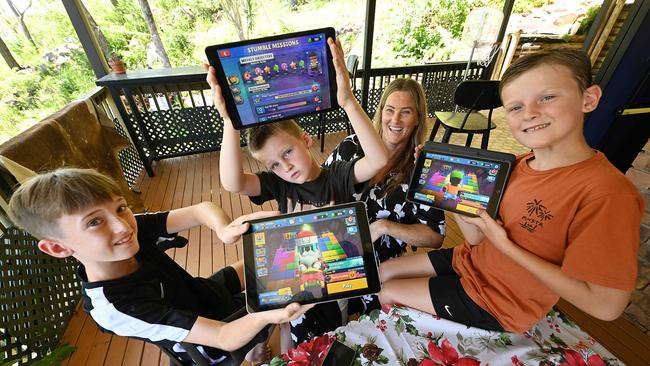Qld parents warned crime gangs, predators targeting kids through common Christmas gifts
Specialist police have seen a spike in kids being blackmailed into sending indecent photos of themselves to predators online, in many cases from their bedrooms while they’re parents are home.

Police & Courts
Don't miss out on the headlines from Police & Courts. Followed categories will be added to My News.
Parents are being warned by specialist Queensland detectives to keep an eye on their kids’ online usage, amid a surge in new electronics gifted as Christmas presents.
Taskforce Argos investigators, who specialise in online child exploitation and abuse, have seen a spike in cases where children are being blackmailed into sending indecent photos of themselves to predators online, in many cases while their parents are home at the time.
Detective Inspector Glen Donaldson, head of Task Force Argos, said children should not be allowed to use an internet-connected device unsupervised, particularly alone in their bedroom.
“Depending on a child’s age and maturity, they should not be allowed to use an internet
connected device unsupervised, particularly alone in their bedroom,” he said.
“Argos has come across cases where children have been tricked or blackmailed into taking indecent images or videos of themselves in their bedrooms, even when parents are at home.
“Globally there has been an increase in financially motivated sextortion of children by offshore organised crime syndicates.

“These syndicates target children on popular social media platforms and then engage in clever social engineering tactics to befriend children and convince them to send intimate images of themselves.
“Once a child sends an image, the blackmail starts very quickly with offenders seeking payment via gift cards and online money transfers.”
With children getting smartphones, tablets, laptops, or game consoles for Christmas, parents are urged to educate themselves and their kids to prevent these gifts becoming nightmares.
Brisbane mum Asha Jansen’s three children all have iPads, they also share a PlayStation 4.
She uses Family Sharing on her kids’ iPads so she can monitor their activity from her phone.
“I’ve told them stories I’ve heard before about people wanting to get access to your details and looking to engage with kids for inappropriate reasons,” Ms Jansen said.
“The kids were quite shocked to hear that. But they do come to me now if they see a random person online who is saying inappropriate things.
“The risk is random people playing these online games, you don’t know who is logging in – whether they are children of a similar age, or older people who are dodgy.
“It’s about building the awareness that it can happen, and it’s not all fun and games.”

Inspector Donaldson said young children are accessing the internet more frequently, and at a younger age, and parents must monitor their child’s online activity from day one.
“Depending on the age of a child, parents should know the passwords to a child’s device and online accounts so that they can ensure their children are behaving safely and to identify risky behaviours before they escalate,” he said.
“Parents must remain engaged with their child’s online lives and have conversations with their children to ensure that no matter what situation happens to their child, the child feels comfortable in seeking help from a trusted adult.”
Triple P head of training and clinical psychologist Dr Alan Ralph said parents must know before they buy what a device can and can’t do, and what safeguard features are available.
“It’s a tricky one because it’s changing almost daily with new features becoming available, and parents can struggle to keep up,” he said.
“There are a range of concerns around cyber-bullying, identity theft, online addiction, and sexual predation.
“The priority is to create an environment at home where your kids feel comfortable to talk to their parents about anything, so that if something happens they won’t feel like they can’t tell their parents because they might get told off, or their devices might be taken away.”
According to research conducted by the Commonwealth eSafety Commissioner, one in four kids have been approached by a stranger online.
A separate survey conducted by the Commonwealth eSafety Commissioner of more than
3500 Australian children and their parents revealed that half of the parents underestimated the prevalence of children’s negative online experiences, and more than half of children admitted to communicating with strangers online, yet only one in three of their parents were aware.
Parents seeking support to educate themselves about cyber safety can access resources through the eSafety Commissioner, Queensland Police Service, Queensland Family and Child Commission, ThinkUKnow Australia, and Triple P Parenting.





